Noam Chomsky’s influence on linguistics in the last half century is probably greater than that of any other linguist. At the age of 94, he is giving a lecture (online) at Aarhus University on February 10, 2023. On the occasion of the event, Peter Bakker and Ken Ramshøj Christensen, both from Aarhus University, sat down to discuss the significance of Chomsky’s generative theory. Both are educated within the theory, but where Peter Bakker abandoned his ‘faith’ in the model several decades ago, Ken Ramshøj Christensen still works within Generative Grammar (abbreviated below as GG). Many years ago, Peter Bakker was thesis supervisor for Ken Ramshøj Christensen’s MA thesis, which was about GG and aphasia. Ken Ramshøj Christensen (KRC) and Peter Bakker (PB) interview each other about Chomsky and GG.
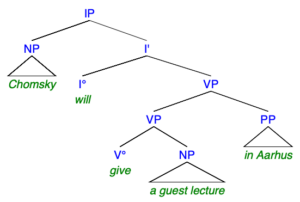
Ken, why and how did you become a generativist?
KRC: First of all, I was fascinated by the formal precision that Noam Chomsky’s GG offered, compared to the many other theoretical approaches that I was introduced when I was a student of linguistics at Aarhus University. Sten Vikner showed me how GG could explain typological differences and similarities in the Germanic languages, and Steven Pinker showed me how GG could be used as an explanatory model for the relationship between language and cognition, including language acquisition, language comprehension and production, language pathology and evolution. Chomsky’s language theory is based on the language ability of the individual, and since I early on became interested in the relationship between language, psychology and the brain, GG was the natural choice for me.
Peter, why didn’t you become a generativist?
PB: As you know, I got solid training in GG in Amsterdam where I studied linguistics, and several of my most admired teachers, later colleagues, were generativists. I think there are several reasons why I did not become a generativist. Already as a student, I was interested in non-(Indo-)European languages, especially Basque and Amerindian languages, and I could not see how they fit into a model based on English. Also, I thought it was strange that when Chomsky changed his mind, the herd automatically followed. I remember a colleague who said: “Oh, now the VP is no longer a ‘barrier'”, when Chomsky’s book came out. And the theory has changed radically, also due to unusability and lots of counter-evidence that has been presented against it. My final goodbye to generativism happened in the late 1980s. At the time, I was completely up-to-date on generative theory, and participated in a large conference on generative linguistics in Utrecht (GLOW, for insiders), where each and every lecture began with “we assume that you all have read Pollock, to appear”. I understood nothing. I decided then and there not to be part of the sect.
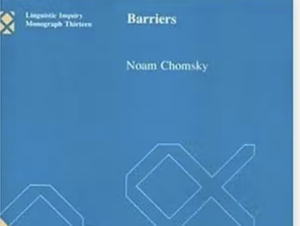
KRC: I have never been a member of any sect, nor have I ever met any of the ‘Chomsky disciples’ I often hear about. (We’ll come back to ’the sect’ below.) It’s true that sometimes, there are papers or books which in certain circles are considered almost common knowledge. But I’ve had exactly the same experience with Functional Grammar.
Peter, what do you think was Chomsky’s most important breakthrough?
PB: There are probably more. One is the idea that language learning is not just imitation, but also the children’s creativity that creates language. According to Chomsky, there has to be a language learning device that is supposed to be universal. On the other hand, we also know that children who are isolated from other language users (i.e. get no language input), do not develop a language themselves, and we know that children who only learn language later in life never learn syntax completely. Tree structures are something else that Chomsky introduced. They are visually attractive, they are realistic, but I am sceptical about movements of constituents.
Ken, what do you think was Chomsky’s most important breakthrough?
KRC: I believe that Chomsky was groundbreaking on several points. His books on the philosophy of language (e.g. Language and Mind and Cartesian Linguistics) helped place linguistics at the focal point between philosophy, psychology and natural science. Other works argued (and argue) that language has two fundamental features: structure dependency (everything has structure, and meaning is compositional) and creativity (language is not a product of stimulus-response conditioning). Chomsky’s approach focuses on the psychological aspect of language (competence) as a starting point for the explanation of what language is, what it can do, and how it can vary and change (descriptive and explanatory adequacy) – including the movement metaphor, which accounts for word order variation.
PB: Yes, theories must be comprehensive in terms of language description and explanatory, but you should add typologically adequate, i.e. suitable for all known languages.
KRC: I agree, and that is also what underlies the theory of Universal Grammar (UG), which is often misunderstood or grossly distorted. UG is a theory of what linguistic rules and regularities might look like, which also means that some of the principles of what is constant, and the parameters of how languages can vary, are quite abstract.
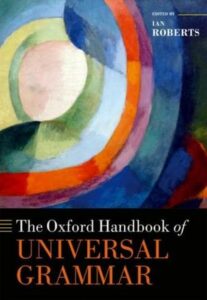
PB: Yes, you can say that again. Quite abstract. I tried to find some concrete findings in the generative Oxford Handbook of Universal Grammar when it came out in 2016, but couldn’t find any.
How much longer will GG be around?
PB: You yourself once wrote a post for Lingoblog entitled Rumors of the death of Generative Linguistics are somewhat exaggerated. It’s hard to tell when it dies. It still dominates in many universities around the world, including the Department of English in Aarhus, but I’ve also spoken to many who do not believe in the theory, but were forced to write their thesis in a generative framework, against their desire or conviction. There are also several generativists who have moved away from the theory. You have to be brave to give up something you have invested most of your career in. I give it maybe 5 or 10 years, then the theory will have pretty much disappeared.

KRC: As far as I can tell, the theory has no expiration date. I think it’s worth pointing out that Chomsky does not have a monopoly on the term generative. It’s a well-known concept in mathematics, computer science, physics and natural sciences in general, and actually also in linguistics. For example, Simon Dik’s Functional Grammar, Adele Goldberg’s Construction Grammar, and Joan Bresnan’s Lexical Functional Grammar are also generative theories. Actually, so is Paul Diderichsen’s field analysis in Danish traditional grammar. And if you move within psycholinguistics and language comprehension, also known as parsing, it’s very difficult to see how to manage without a generative model. As long as one is interested in finding and explaining similarities and patterns of variation in and between languages, and not just statistical descriptions of how many languages do one thing or the other, then some kind of generative model is needed. That is, a theory that generates structures, i.e. makes empirical predictions about (degrees of) possible and impossible language structures.
PB: What do you mean by generative? How are the other theories also generative?
KRC: They are theories where linguistic representations are formed (i.e. generated) from a relatively simple set of rules, categories, and constructions or schemes. Often the heated debate about ‘Chomsky or not’ is not so much about data or the descriptive apparatus, but perhaps more about assumptions about domain specificity, i.e. to what extent parts of language can be said to be unique or independent of general cognitive mechanisms, and about the relationship between form and function.
Is GG the same theory as in the 1960s, or is it something completely different?

KRC: Both yes and no. The theory (that is, if you can talk about one theory at all) has changed quite a lot, but there’s nothing strange about that. It is standard in science that theories adapt when new data appears, cf. e.g. the atomic model, the theory of evolution, or models of the solar system, etc. Theories that are scientific develop and change as the hypotheses they form are either confirmed or rejected as new data emerges. The theory is the same, because it is still GG with a focus on the linguistic competence of the individual and on the internal structure of the language. On the other hand, it is not the same, as significant concrete parts of the theory have changed. It has changed from describing and explaining using rules (e.g. S -> NP VP, VP -> V (NP), i.e. a sentence consists of a noun phrase (NP) and a verb phrase (VP), which in turn, consists of a verb V and potentially another NP), and from explaining relationships between different sentences as transformations, to seeing them as different syntactic derivations from the same underlying argument structure.
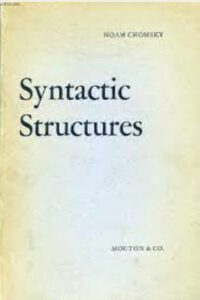
(In short, argument structure consists of a main verb and the constituents, ‘arguments’, which play the semantic roles in the action or state designated by the verb and can be realized as either subject or object, e.g. eat, which has two arguments: someone who eats, and something that is eaten). For the last 30 years, the branch of GG called Minimalism has aimed to explore what and how much can be explained using non-linguistic factors, and what is possibly common to language and other cognitive systems and what is unique to the language. The theoretical explanations and analyses (e.g. the syntactic trees) in scientific articles therefore often look somewhat different than they did 50 years ago, but many of the fundamental assumptions are still the same.
PB: In my view, the theory is clearly something completely different now, you can’t deny that. Almost everything that was central in the 1960s, such as movement, transformations and depth structure, all these concepts have disappeared, as you also say. I’m not quite up-to-date, I must admit. I was asked twice to review generative books in the past couple of years, and the line of thought in both books went something like this: “Chomsky said X, Jensen tried it with Danish and came up with Y because it didn’t quite work, Poretti found it didn’t work with Italian and came up with Z. However, I found Chateauvieux’s theory who came up with Z2 to be best, and I modify it to fit my language.” It’s as if it’s a theory where you choose a phase of theory development that fits your data best. Of course it’s only a good sign if a theory evolves, but I honestly, don’t see much progress if newer versions are not better than old ones.
KRC: I don’t necessarily think that all the recent developments are improvements either. If it wasn’t OK to choose a different version than Chomsky’s own most recent version, it would be dogmatic, but fortunately that’s not the case. It’s a theoretical framework that’s constantly being challenged, empirically and conceptually, not only from the outside, but also from within. And new ideas are tested and modified (such as the displacement metaphor) or discarded at the expense of earlier ideas. I believe this is sound scientific practice.
Does GG also work for more exotic languages?
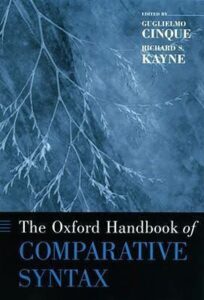
PB: In the 18th century, written grammars of languages were based on Latin. They looked for the same categories in the languages, even if they didn’t have them. Case paradigms with dative, ablative in languages without case, for example. In GG, it is undeniably English that is the model. A theory must account for all the data. The theory in its various phases seems incredibly elegant and therefore attractive, e.g. the Government-Binding model. A few simple rules. Fantastically beautiful. But all languages are incredibly complicated, and this means that you need a large extra package of rules for each and every language. Just take morphology. The morphologist Stephen Anderson had to write a supplementary article “Where’s morphology” after Chomsky’s 1981 book, because word-formation wasn’t mentioned at all. The brilliant generativist Ken Hale tried to develop the concept of “non-configurational languages” for languages with a lot of morphology and free order of words, but basically, GG is a syntactic theory where morphological complexity is of marginal interest. However, the theory does not work for English, even less for other languages.

KRC: I disagree. As you know, I work at the Department of English, where we use GG, and it actually works really well, and as far as I can tell, the theory is used for pretty much every language around the world. In any case, there are a multitude of books and articles with comparative, generative analyses of a large number of languages (also non-Indo-European languages), including Basque, Hebrew, Chinese, Navajo, Russian, Aboriginal languages, etc. (see e.g. Baker 1995, The Polysynthesis Parameter, Cinque & Kayne 2005, The Oxford Handbook of Comparative Syntax, or the works of Ken Hale). Here one could also ask “what is meant by exotic?” Does it have to be an Austronesian or Amerindian language, or isn’t Danish exotic as well? It’s true that English is usually the metalanguage in GG introductory books or technical theoretical articles, but the biggest changes in GG were driven by data from other languages.
PB: Yes, the term ‘exotic’ should be avoided. One of our exchange students, I remember, protested when I called some languages exotic. My colleague Jakob Steensig has also written an article called “Danish is an exotic language”, and it is.
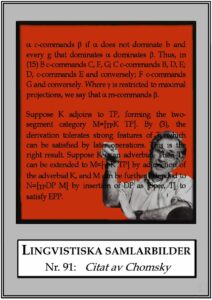
Does GG have too many formalizations and Greek and mathematical symbols?
KRC: No, I don’t think you can say that, at least not without being specific about which phenomenon we are talking about. It’s also quite common in e.g. mathematics, physics, organic and inorganic chemistry, and everything involving statistics, that generalizations contain different variables that are often called e.g. x, y, z, or alpha, beta, gamma, etc. One can hardly claim that organic chemistry has too many symbols and equations, that it doesn’t resemble and therefore can’t explain how organic material which can easily be found in the world around us looks and is used (take for example alcohol). GG strives to explain language with as simple and rigorous a system as possible. This means that the theory as such remains “simple”, while often, the explanations and descriptions are not, and do not need to be so.
PB: I agree with you here. The mathematics in GG is relatively clear. Kees Hengeveld’s Functional Discourse Grammar theory is much more formal and mathematical than GG. So, linguistics students may be scared away for the wrong reasons. You said before that GG was not sectarian.
Don’t you think GG is more sectarian and dogmatic than other approaches?
KRC: No, I really don’t think so. I also don’t think it belongs in academic circles at all. There are probably at least as many different approaches within functional linguistics, cognitive linguistics, semiotics, communication theory, and other areas that have to do with language as there are within generative linguistics. Chomsky is influential, yes, but he’s neither boss, king, pope, nor high priest. He’s a language theoretician and philosopher of language, and there are many also within generative linguistics, e.g. Joan Bresnan, Ray Jackendoff, Frederick Newmeyer, and Steven Pinker, who do not agree with Chomsky’s ideas about, e.g., what a theory of language should be able to explain, what syntax is, what language acquisition is, what the relationship between language and cognition is, what linguistic evolution is, etc. I wonder if the same can’t be said about, say, Halliday, Bybee, or Tomasello, who are not supporters of GG?
PB: In my view, GG seems more dogmatic than some other theories. It’s my impression that it’s a habit for generativists to only read other generativists, and then it’s as if they believe they have the ’true teachings’ – seen by an outsider like me. There are of course also other currents within linguistics, such as conversation analysis, where you have the same tendency (fortunately not as strongly in Aarhus as elsewhere). Things happen in religious sects that also happen in GG. If you leave the sect, or perhaps even if you surround yourself with people who do not share the same beliefs, you will be ostracized and perhaps even persecuted. But it’s not that bad in GG, is it?
KRC: As I said, I have never been a member of any sect, and don’t know anyone who is. In my own work, for instance together with Anne Mette Nyvad, I have also questioned some of the core ideas in GG, but that hasn’t led to enmity. The good thing about GG is precisely that it’s a theory with empirical hypotheses that can be tested. There are several, very different versions of GG, but that doesn’t mean that you cannot discuss the data or the theoretical framework itself. Not in my experience anyway. And it’is not true that generative linguists do not read and refer to books and articles written by non-generativists. This is actually very easy to document. I suspect it’s probably more likely the other way around, but I could be wrong.
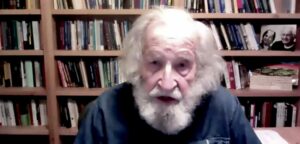
Is Chomsky never/always wrong?
PB: It’s hard to judge. Even if he has ever been right, haha! I think the political books of his that I have read were good. However, I must say that he’s very skilled when it comes to linguistic discussions. In discussions, he always waves away the criticisms in a manner that makes it sound like he has always been right. Even if there is a lot of counter-evidence or counter-examples. In any case, it is misleading to say that all languages are variations on the same theme, and that language descriptions are just like butterfly-catching, because one specimen (a language) is enough to be able to theorize about universal properties of language. Also, in GG, you can only do a sentence analysis when you have the whole sentence available, but we know that people already interpret it easily from the first word in an utterance.
KRC: It’s true that we don’t wait until we’ve heard a whole sentence before we begin to interpret the meaning. We also don’t always know what we want to say before we start speaking, and often we use fragments instead of whole sentences. But the point is that both our understanding of language and our use of language basically follow the rules of grammar, or the sentence analysis, if you will. I have heard and read many times about claims that someone has shown that “Chomsky is wrong”, often generalized from individual points where one disagrees, and often without reference to any specific hypotheses. He has been wrong many times, and consequently, his theory has also developed radically since 1957, and he rarely looks back. But he’s also been right many times, because his theoretical paradigm has spurred a wealth of empirical research within all parts of linguistics. It’s been shown countless times that the predictions made by GG hold true when they are examined empirically, for example in psycholinguistic experiments, and in studies of language acquisition or how language is affected by brain damage. You can also rightfully say that it’s a high demand to never make any mistakes. Many wise people have also been wrong, but have been right on many other, more important points, including, for example, Albert Einstein, Isaac Newton and Max Planck.

PB: Yes, wise people can also be wrong, and which one of us is more right? I guess we can leave that to our clever readers, who we would encourage continue the discussion in the comment section. And of course, they have to come and hear Chomsky in Aarhus. After all, he was invited by linguistics students who repeatedly hear critical voices about GG, and now they want to hear it from the master himself.
KRC: I think it’s very impressive that a bunch of linguistics students have taken the initiative for such an event and that they have taken the bull by the horns and contacted Chomsky himself. Commendable. Whether you fully or partially agree or disagree with him is secondary. It is important to be objective and critical, but also to be curious and open to dialogue. And here, at least, I think we both agree.

ViGØr will be visited by Noam Chomsky on 10/2 – see event information here.
Peter Bakker (PhD, University of Amsterdam, 1997) is associate professor of linguistics at Aarhus University. He sees language as a communicative tool rather than an innate ability. He cultivates linguistic diversity, and has dealt with language contact and new languages, and has acquired insights into most language types, isolating, inflecting, agglutinating and polysynthetic languages. Fortunately, he got away from generative theory in good time, which in his eyes has been more harmful than beneficial to knowledge about language and languages.
Ken Ramshøj Christensen is associate professor in English linguistics at Aarhus University. He sees language as a cognitive system that is the product of the interaction between genetic and cultural factors. He deals with comparative syntax, psycholinguistics, and neurolinguistics, i.e. empirical, experimental studies of grammar and language processing. He is educated in Linguistics at Aarhus University, from which he has knowledge of functional linguistics, but has ever since worked with generative linguistics, which in his eyes, has generated invaluable insight into what language is and what it isn’t.








The venue has changed. Chomskys zoom lecture will take place I Per Kirkeby Auditorium, Sø-auditorierne.
https://www.au.dk/om/organisation/find-au/bygningskort/?os=27